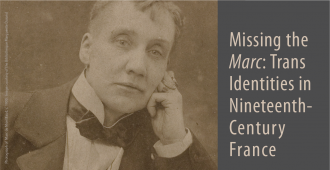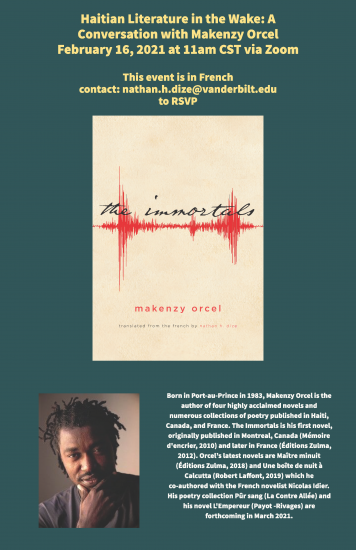
The W.T. Bandy Center partnered with our campus colleagues to offer two webinars in the past year.
The Department of French and Italian, the W.T. Bandy Center, the Vanderbilt Cinema & Media Arts Department, and the libraries co-sponsored “Missing the Marc: Trans Identities in Nineteenth-Century France” with guest lecturer Rachel Mesch, professor of English and French and chair, English Department, Yeshiva University; National Endowment for the Humanities Public Scholar Fellowship, 2017-18.
Marc de Montifaud was a renowned art critic before publishing titillating works that were repeatedly censored for “offense to public decency.” Montifaud was bewildered by punishments they felt didn’t fit the crime and continued to write erotic tales as well as passionate treatises in self-defense. They were as angry about being censored as about being sent to a women’s prison rather than the one where male artists and writers were sent for similar infractions.
This talk explored Montifaud’s efforts to express their gender nonconformity, arguing that the disproportionate response by the forces of authority was a function of the public’s inability to identify the precise nature of Montifaud’s affront. Montifaud refused to concede because they thrived on this perpetual misunderstanding, which allowed them to make visible a state of tension with a world that had not yet imagined them.
 The second webinar explored the book, The Immortals, set in an infamous neighborhood of Port-au-Prince, on Grand-Rue, where many women, young and old, trade in flesh, sex, and desire. We learn, in glimpses and fragments, about the lives of women who fall in love with the moving images of television, the romance of a novel, and the dreams of escape. In his first novel, Makenzy Orcel ultimately asks: What becomes of these women, their lives, their stories, their desires, and their whims when a violent earthquake brings the capital city and its brothels to their knees?
The second webinar explored the book, The Immortals, set in an infamous neighborhood of Port-au-Prince, on Grand-Rue, where many women, young and old, trade in flesh, sex, and desire. We learn, in glimpses and fragments, about the lives of women who fall in love with the moving images of television, the romance of a novel, and the dreams of escape. In his first novel, Makenzy Orcel ultimately asks: What becomes of these women, their lives, their stories, their desires, and their whims when a violent earthquake brings the capital city and its brothels to their knees?
In this conversation between Makenzy Orcel and Nathan H. Dize (French and Italian), participants discussed the genesis of The Immortals, its legacy eleven years after its publication, the themes it discusses and engenders, and the future of Haitian literature.
This event was sponsored by the W.T. Bandy Center for Baudelaire and Modern French Studies and the Department of French and Italian.